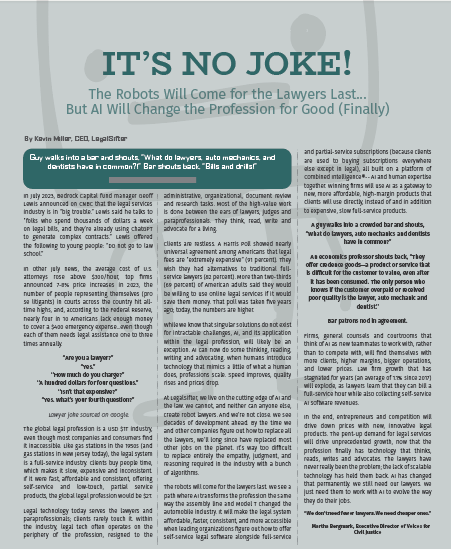MindShare: Artificial Intelligence Is Transforming the Legal Industry
By Kevin Miller, LegalSifter
 Guy walks into a bar and shouts, “What do lawyers, auto mechanics, and dentists have in common?!” Bar shouts back, “Bills and drills!”
Guy walks into a bar and shouts, “What do lawyers, auto mechanics, and dentists have in common?!” Bar shouts back, “Bills and drills!”
(ChatGPT-generated lawyer joke.)
In July 2023, Bedrock Capital fund manager Geoff Lewis announced on CNBC that the legal services industry is in “big trouble.” Lewis said he talks to “folks who spend thousands of dollars a week on legal bills, and they’re already using ChatGPT to generate complex contracts.” Lewis offered the following to young people: “Do not go to law school.”
In other July news, the average cost of U.S. attorneys rose above $300/hour, top firms announced 7-8% price increases in 2023, the number of people representing themselves (pro se litigants) in courts across the country hit all-time highs, and, according to the Federal Reserve, nearly four in 10 Americans lack enough money to cover a $400 emergency expense…even though each of them needs legal assistance one to three times annually.
“Are you a lawyer?”
“Yes.”
“How much do you charge?”
“A hundred dollars for four questions.”
“Isn’t that expensive?”
“Yes. What’s your fourth question?”
(Lawyer joke sourced on Google.)
The global legal profession is a USD $1T industry, even though most companies and consumers find it inaccessible. Like gas stations in the 1950s (and gas stations in New Jersey today), the legal system is a full-service industry. Clients buy people time, which makes it slow, expensive and inconsistent. If it were fast, affordable and consistent, offering self-service and low-touch, partial service products, the global legal profession would be $2T.
Legal technology today serves the lawyers and paraprofessionals; clients rarely touch it. Within the industry, legal tech often operates on the periphery of the profession, resigned to the administrative, organizational, document review and research tasks. Most of the high-value work is done between the ears of lawyers, judges and paraprofessionals. They think, read, write and advocate for a living.
Clients are restless. A Harris Poll showed nearly universal agreement among Americans that legal fees are “extremely expensive” (91 percent). They wish they had alternatives to traditional full-service lawyers (82 percent). More than two-thirds (69 percent) of American adults said they would be willing to use online legal services if it would save them money. That poll was taken five years ago; today, the numbers are higher.
While we know that singular solutions do not exist for intractable challenges, AI, and its application within the legal profession, will likely be an exception. AI can now do some thinking, reading, writing and advocating. When humans introduce technology that mimics a little of what a human does, professions scale. Speed improves, quality rises and prices drop.
At LegalSifter, we live on the cutting edge of AI and the law. We cannot, and neither can anyone else, create robot lawyers. And we’re not close. We see decades of development ahead. By the time we and other companies figure out how to replace all the lawyers, we’ll long since have replaced most other jobs on the planet. It’s way too difficult to replace entirely the empathy, judgment, and reasoning required in the industry with a bunch of algorithms.
The robots will come for the lawyers last. We see a path where AI transforms the profession the same way the assembly line and Model T changed the automobile industry. It will make the legal system affordable, faster, consistent, and more accessible when leading organizations figure out how to offer self-service legal software alongside full-service and partial-service subscriptions (because clients are used to buying subscriptions everywhere else except in legal), all built on a platform of Combined Intelligence®-- AI and human expertise together. Winning firms will use AI as a gateway to new, more affordable, high-margin products that clients will use directly, instead of and in addition to expensive, slow full-service products.
Firms, general counsels and courtrooms that think of AI as new teammates to work with, rather than to compete with, will find themselves with more clients, higher margins, bigger operations, and lower prices. Law firm growth that has stagnated for years (an average of 1.1% since 2017) will explode, as lawyers learn that they can bill a full-service hour while also collecting self-service AI software revenues.
In the end, entrepreneurs and competition will drive down prices with new, innovative legal products. The pent-up demand for legal services will drive unprecedented growth, now that the profession finally has technology that thinks, reads, writes and advocates. The lawyers have never really been the problem; the lack of scalable technology has held them back. AI has changed that permanently. We still need our lawyers. We just need them to work with AI to evolve the way they do their jobs.
“We don’t need fewer lawyers. We need cheaper ones.”
Martha Bergmark, Executive Director of Voices for Civil Justice